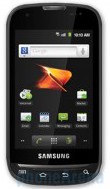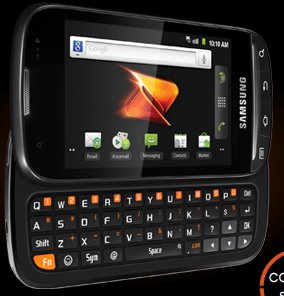Prepaid Android 2.3 phone features 1GHz processor, QWERTY keyboard
Sep 16, 2011 — by Eric Brown — from the LinuxDevices Archive — 1 viewsPrepaid phone provider Boost Mobile announced a mid-range Samsung smartphone with a QWERTY keyboard and a $230 no-contract price tag. The Samsung Transform Ultra runs Android 2.3 on a 1GHz processor, and offers 3G, Wi-Fi, GPS, a three-megapixel camera, a front-facing VGA webcam, and Android Market support, the mobile provider says.
 The Samsung Transform Ultra (pictured) joins a growing number of mid-range Android phones available from prepaid wireless providers in the U.S. Boost Mobile is one of Sprint's prepaid, no-contract brands along with Virgin Mobile USA, which recently launched the 4.1-inch, 1GHz Motorola Triumph and also offers the 3.2-inch Samsung Intercept.
The Samsung Transform Ultra (pictured) joins a growing number of mid-range Android phones available from prepaid wireless providers in the U.S. Boost Mobile is one of Sprint's prepaid, no-contract brands along with Virgin Mobile USA, which recently launched the 4.1-inch, 1GHz Motorola Triumph and also offers the 3.2-inch Samsung Intercept.
The Tranform Ultra is a step up from Boost Mobile's other Android phone, the $180 Samsung Galaxy Prevail, which in four months has become the best-selling no-contract smartphone in Samsung's history, according to the mobile provider. (The 3.2-inch, non-QWERTY Prevail runs Android 2.2 on an 800MHz ARM11 processor, according to an April PCMag review.)
Boost Mobile makes no mention of the screen size of the new Samsung Transform Ultra, but PhoneArena pegs it as a 3.2-inch, 480 x 320 capacitive touchscreen. The smartphone appears to be a modified version of the 3.5-inch, QWERTY slider Samsung Transform announced in October 2010 on Sprint.
The Transform ran Android 2.1 — and then Android 2.2 — on an 800MHz, ARM11-based S3C6410 applications processor. The Transform Ultra, on the other hand, moves up to Android 2.3 ("Gingerbread") and an unnamed 1GHz chip, according to Boost Mobile.

Samsung Transform Ultra
Also available are 3G (CDMA EVDO), Wi-Fi, GPS, and a speakerphone, says the company. The 4.57 x 2.4 x 0.55-inch, 4.9-ounce Transform Ultra is also said to be "Bluetooth capable," and a Bluetooth headset is available for $60. PhoneArena also lists an accelerometer and a micro-USB 2.0 port, which could be the source of the Bluetooth support.
On the software front, you get Android 2.3 with access to Android Market, as well as Gmail and Google Talk, says Boost Mobile. The Transform Ultra is also Boost's first Android smartphone to come preloaded with Mobile ID, a service that lets customers download and install "ID packs" of apps, widgets, ringtones, and wallpapers.
Each ID pack offers different selections based on lifestyle profile. ID packs are said to include MTV Music, E!, Socially Connected, Professional, Entertainment, Lo2Yo Latino, Lo2Yo Mujer, and Lo2Yo Futbol.
Availability
Samsung Transform Ultra will be available Oct. 7 for $230 (excluding taxes) at Boost Mobile's online store, retail stores, and select independent wireless dealers in the U.S. More information may be found at Boost Mobile's Samsung Transform Ultra product page.
Sadly, starting Oct. 6, Boost Mobile will add an additional $5 monthly charge for unlimited data and messaging services offered on Android-powered devices. On the other hand, for every six on-time payments, the cost of a new customer's Android Monthly Unlimited plan will shrink by $5, eventually getting down to as low as $40 a month — only $5 more than the current "Monthly Unlimited with Shrinkage," says Boost Mobile.
Existing $50 Monthly Unlimited customers with Android devices as of Oct. 6 can keep their current price plan as long as they don't let their account expire. Existing Monthly Unlimited customers upgrading to a CDMA Android-powered device on or after Oct. 6, will add a $5 monthly charge on their current monthly payment without losing any of their accrued Shrinkage savings.
All this may prove to be a good deal, but isn't simplicity supposed to be part of prepaid's appeal? Sure, there's a lot more fine print to wade through on a Sprint or Verizon plan, but Boost Mobile seems to be heading in that direction.
This article was originally published on LinuxDevices.com and has been donated to the open source community by QuinStreet Inc. Please visit LinuxToday.com for up-to-date news and articles about Linux and open source.